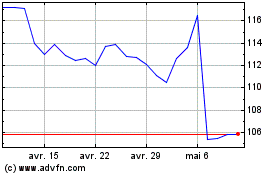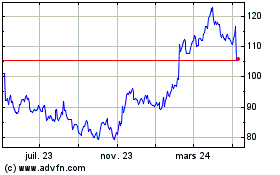By Steven Russolillo and Stella Yifan Xie
HONG KONG--When Suki-Rose Etter and her husband visited Hong
Kong Disneyland on Wednesday, they immediately noticed something
was off: Few visitors. No lines.
"It's like a ghost town," said Ms. Etter, 32 years old. "It
feels like there are more employees than visitors."
More than five months of antigovernment protests have slammed
Hong Kong's economy, and tourism is among the hardest-hit
industries. Visitors from around the world are staying away.
Visitors from mainland China, Hong Kong's biggest source of
tourists, plunged 46% in October from a year ago, according to data
from the city's tourism board.
Ms. Etter and her husband thought of skipping Hong Kong during
their two-week Asia trip because of the protests. They made a brief
stop to the city on a layover before heading back home to Los
Angeles.
"It almost feels wrong to be in Disney," she said, "especially
since we know so many others are out on the streets fighting for
democracy."
Clashes between protesters and police have at times brought the
city to a halt, causing stores to close, hotels to sit empty and
music and dining festivals to be canceled. Hong Kong's economy fell
into a recession, for the first time since the 2008-09 financial
crisis, in the quarter that ended Sept. 30. That was before some of
the most violent and disruptive protests over the subsequent two
months. Economists don't expect growth to pick up anytime soon.
A trip to Hong Kong Disneyland shows the impact.
Weekday visitors to Hong Kong Disneyland have fallen by about
90% since protests began, according to rough estimates from a staff
employee. He said tourists from mainland China now make up only an
estimated 5% of the weekday crowd, versus at least half prior to
the protests.
A Disney spokesperson didn't dispute the figures, but wouldn't
give specific figures beyond its public disclosures.
On an earnings call in early November, Christine McCarthy, chief
financial officer at Walt Disney Co., said Hong Kong Disneyland's
operating income dropped $55 million in its most recent quarter.
She forecast a $275 million drop in operating income in the current
fiscal year through September 2020 if trends continue, saying
circumstances in Hong Kong have led to a significant drop in
tourism from mainland China and other parts of Asia.
Disney opened the park in 2005 in a joint venture with the Hong
Kong government. The smallest of Disney's six theme parks, it
expanded several years ago in an attempt to boost sagging
attendance.
Today, the Hong Kong site is overshadowed by Disneyland's more
modern and expansive park in Shanghai, which opened in 2016. Hong
Kong Disneyland has only been profitable for three years.
The protests haven't deterred Deng Bo'er, 26, a Chinese
freelance illustrator who boarded a half-empty red-eye flight in
late November from Shanghai to Hong Kong. A Disney fanatic, she
spent four days in Hong Kong Disneyland in what was her second trip
there from mainland China. She said she lied to her parents and
told them she was going to Shanghai Disneyland, because they didn't
want her to go to Hong Kong.
Ms. Deng came in costume. She wore light blue sunglasses and
dressed as a blue koala in a Santa Claus suit mimicking her
favorite Disney character, Stitch. She tried getting fellow Stitch
fans from a more than 200-member WeChat messaging group to join
her, but no one would.
"I was the only one," she said, surprised by how few Chinese
tourists were there. "I can barely hear anyone speak in
Mandarin."
She said she prefers the Hong Kong Disney park over Shanghai's.
"The staff here work hard to maintain a fairytale-like environment.
The Shanghai Disneyland feels too commercialized," she said.
Disney's theme-park division has been among its fastest-growing
units in recent years. Revenue for the segment rose 6% to $26.2
billion in its latest fiscal year that ended in September.
International expansion has been a key source of that growth.
Disney has recently tried to boost its business in Hong Kong.
The company is offering discounts on some annual passes, as well as
markdowns of up to 50% on dining and hotels. "We have been closely
monitoring the market situation" and promotions can fluctuate, a
Disney spokesperson said.
Nearly four out of every five visitors to semiautonomous Hong
Kong in the past five years have come from mainland China,
according to Tianlei Huang, a research analyst at the Peterson
Institute for International Economics. And the reduction in those
visitors has impacted almost every aspect of the city's
economy.
The city's hotel occupancy rate dropped to 68% in October, from
a monthly average of 89% in the first six months of the year.
Retail sales by volume fell by 20% in the third quarter from a year
earlier, and the city expects the October figure to reflect another
steep decline when it is released on Monday.
The blow to the Hong Kong economy this time has been different
than previous downturns, including the Asian financial crisis in
the late 1990s, the SARS epidemic in 2003 and the global financial
crisis, said Andrew Tilton, chief Asia Pacific economist at Goldman
Sachs.
"This one is clearly more domestically focused in the sense that
it's affected retail and tourism spending," Mr. Tilton said.
Disney built Hong Kong Disneyland on an island separate from the
central parts of Hong Kong where many of the protests have
occurred. The park is easily accessible on public transit and is
only 11 miles from the international airport.
On a recent weekday afternoon, the estimated wait time for
attractions at Hong Kong Disneyland was less than 15 minutes,
whereas the most popular rides at Shanghai Disneyland had wait
times of between 60 and 90 minutes, according to estimates listed
on the company's apps.
Alex Wong, a 31-year-old Hong Kong resident, was taking a family
photo in front of a Christmas tree with his wife and 1 1/2-year-old
child. Standing in the middle of a quiet cobblestone street with
waltz music blasting from hidden speakers, he was surprised by how
empty the park was.
"Now you look around you can hardly see any people," said Mr.
Wong, a former designer at Disney who currently runs a toy company.
"I think it's better for me and my family, but I don't think this
is a good future for Hong Kong."
Erich Schwartzel contributed to this article.
Write to Steven Russolillo at steven.russolillo@wsj.com and
Stella Yifan Xie at stella.xie@wsj.com
(END) Dow Jones Newswires
December 01, 2019 05:44 ET (10:44 GMT)
Copyright (c) 2019 Dow Jones & Company, Inc.
Walt Disney (NYSE:DIS)
Graphique Historique de l'Action
De Mar 2024 à Avr 2024

Walt Disney (NYSE:DIS)
Graphique Historique de l'Action
De Avr 2023 à Avr 2024
